Actions by the export segment highlight the socioenvironmental responsibility of Brazilian coffees
The year 2023 was marked by discussions and approvals of unilateral regulations with extraterritorial effects in important markets for Brazilian coffee. These decisions highlight the importance of promoting transparency in compliance with social, environmental and governance criteria throughout the Brazilian coffee supply chain.
To adapt to this scenario, Cecafé, relying on its member exporters and strategic partners, has advanced in the development of institutional projects and initiatives aligned with ESG, as well as actions to promote the international image of Brazilian coffee, with a focus on the sustainability of national coffee production.
To adapt to this scenario, Cecafé, relying on its member exporters and strategic partners, has advanced in the development of institutional projects and initiatives aligned with ESG, as well as actions to promote the international image of Brazilian coffee, with a focus on the sustainability of national coffee production.
Institutional actions related to the EUDR and initiatives to promote the image of Brazil in 2023:
1- EUDR: Anti-Deforestation Regulation
One of the regulatory decisions with the greatest impact on the international coffee trade was the European Anti-Deforestation Regulation (EUDR), which entered into force on June 29, 2023, and which aims to prohibit, as of December 30, 2024, the trade in EU territory of a list of commodities (including coffee) that do not meet three requirements: (i) are deforestation-free as of December 31, 2020; (ii) have been produced in accordance with the relevant legislation in the country of production; and (iii) provide a declaration of due diligence.
As a direct participant in the global discussions related to this new trade regulation, Cecafé has worked in partnership and in close contact with various organizations to communicate the reality of Brazilian coffee production in terms of environmental protection, as well as to seek greater clarification on the application of the EUDR and to mitigate its impact on Brazilian coffee exports.
Of note is the ongoing dialogue with the European Coffee Federation (ECF), Digital Integration of Agricultural Supply Chains Alliance (DIASCA), Deutsche Gesellschaft für Internationale Zusammenarbeit (GIZ), Initiative for Sustainable Agricultural Supply Chains (INA), National Coffee Association (NCA), Joint Research Centre (JRC), International Coffee Organization (ICO), Al-Invest Verde Program; International Trade Center (ITC), Global Gateway, British Coffee Association (BCA), European Parliament, European Commission and Delegations, European Union Space Agency (EUSPA), Sustainable Pathways for EU-Brazil Ties and with importers, cultural sectors, local media, among others, including Brazilian Embassies and Missions in various countries and economic blocs.
In order to promote transparency and efficiency in the monitoring of socio-environmental compliance, especially the assessment of deforestation risks along the supply chain of national coffees, as required by the EUDR, Cecafé launched the Cafés Brazil Coffees Traceability Platform, developed by Serasa Experian and managed by Cecafé, which already has more than 40 members, including national, global and cooperative companies, representing the majority of Brazilian coffee exports to the European Union.
The platform provides up-to-date information from hundreds of official public databases that assess and monitor socio-environmental issues supported by national legislation. One of the cornerstones of the tool is the Rural Environmental Registry (CAR), which is mandatory for all rural farmers according to the Brazilian Forest Code, resulting in the acquisition of polygons and geo-referenced data of coffee producing areas as defined by the EUDR.
The geolocation of all Brazilian coffee producers allows the due diligence steps required by the EUDR to be carried out, facilitated by technology that generates real-time updates and automated alerts according to changes in the status of compliance with national legislation and changes in land use on coffee properties as of December 31, 2020. In this regard, “Prodes” and “MapBiomas” are the main monitoring and deforestation risk assessment systems adopted by the Platform.
EUSPA and Pilot Projects
Building on the entire Brazilian regulatory framework and the Platform, Brazil has been designated as a Pilot Project for EUSPA, ECF and the European Commission. The project generates knowledge, experience and benchmarks for other nations in a proactive and realistic manner, helping to demonstrate the country’s strengths as well as the complexity of the production chain and the development of guidelines for coffee in the process of implementing the EUDR by 2024.
The aim of the pilot project is to carry out coffee exports monitored by EUSPA and the European Commission in order to demonstrate the complexity of the production chain, while at the same time highlighting the sustainability and efficiency of Brazilian coffee production, in particular the existing regulatory framework and the export sector, which operates in an efficient and collective manner.
JRC and Coffee Plantation Mapping
The dialogue established with the JRC was also noteworthy. During meetings with Cecafé, the JRC presented the main components of the recently launched European Union Global Deforestation Observatory (Global Forest Monitoring; Commodity Production and Trade; and Global Forest Monitoring Tools).
The Global Map of Forest Cover is a tool provided to EU operators and authorities as an option for assessing the risk of deforestation in agricultural areas in the EUDR (to represent the status of standing forest cover as of 31.12.20) and should not be used to verify compliance of commodities listed in the EUDR for export to the EU.
It is important to emphasize that the use of this map should be for risk assessment purposes only and that, as with any map, the tool has limitations in terms of accuracy. To this end, the JRC recommends that where local maps and images of producing regions exist, they should be used to verify compliance with the EUDR rather than the Global Forest Cover Map for 2020.
The European Commission and the JRC emphasized that the decision on the tool to be used to assess deforestation risks for the EUDR will be made exclusively by the operator (importer), subject to the penalties of the law.
Given the strategic importance of this issue, Cecafé and Serasa Experian, with the participation of exporting members and professionals specialized in remote sensing studies, will hold a workshop on January 22 in São Paulo (SP). The objective is to analyze the mapping of existing coffee farms in Brazil, as well as the possibility of using available satellite imagery technologies to improve existing data in Brazil.
Dialogue between the European Commission and Partners Funded by the Economic Bloc
The dialogue with the European Commission, its agencies and institutes directly funded by the European Bloc continued throughout 2023. For example, last December, Cecafé participated and spoke at the event “Dialogue and exchange of experiences on the sustainability of the coffee value chain”, promoted by the European Union’s AL-INVEST Verde program, in Pitalito, Huila, Colombia. The objective of the event was to deepen the knowledge of the EUDR and to align alternatives among producing countries to meet these requirements in the coffee sector.
At the end of the event, each country’s strengths and weaknesses in meeting the EUDR were listed. Brazil’s strengths included the mention of the CAR, which was officially recognized as a highlight for meeting the criteria of the regulation.
The formalized process took place in a final presentation with the logo, support and knowledge of the EU. This recognition of the Forest Code, a Brazilian public policy, is an important step forward and signals that Brazil is an example of sustainability and is moving in the right direction to meet European expectations.
Increasing the efficiency of technology to monitor socio-environmental compliance in coffee producing regions is essential in an era of increasing regulations requiring due diligence throughout the commodity supply chain. In this sense, the preliminary agreement between the Council and the European Parliament on the Directive on Corporate Sustainability Due Diligence, announced on 14/12/2023, reinforces this trend.
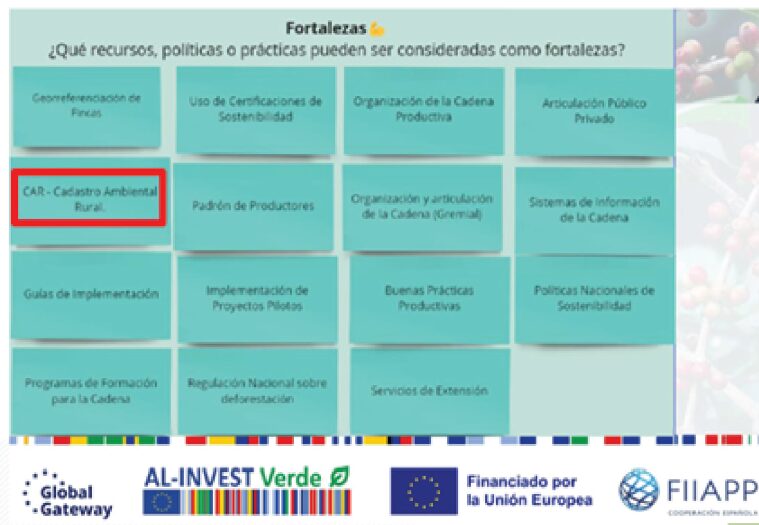
This directive aims to promote the protection of the environment and human rights in the EU and worldwide by establishing due diligence obligations for large companies with regard to potential or actual negative impacts on human rights and the environment in relation to their own operations, those of their subsidiaries and those of their business partners.
Monitoring the progress of this agreement, as well as the adoption of this objective of the economic bloc by the 27 member countries, will be among the priorities of the institutional agenda of the Coffee Exporting Segment in 2024.
In strategic partnership with global coffee organizations and the structure that represents Brazil’s interests abroad, Cecafé continues to monitor other regulations that affect the flow of trade, such as the Corporate Social Responsibility Due Diligence in Germany, new aspects of the Green Deal in the European Bloc (Social Due Diligence), as well as the current debates on new anti-deforestation laws in Switzerland, the United Kingdom and the United States.
2 – GLOBAL DEBATES ON MRLs: Maximum Residue Levels
Other highlights in 2023 included two important decisions in the European Union that reduce the risk of a further discrepancy between Maximum Residue Levels (MRLs) in Europe and Brazil: (i) the publication on November 28 of EU Regulation 2023/2660, which formalizes the renewal of the authorization to use glyphosate in the European Union for a period of ten years, until December 15, 2033; and (ii) the rejection by the European Parliament on November 22 of the proposal for a Regulation on the Sustainable Use of Pesticides (SUP), which would have set mandatory, binding targets for European Union Member States to reduce pesticide use by 50% by 2030.
Despite the recent favorable rulings, the exporting sector continues to pay close attention to MRL policies in destination countries, as there is still a great deal of discrepancy between the standards in force in Brazil and those established by importing countries.
To this end, the actions of the Safe Coffee Program will continue to evolve in 2024, structured around four pillars: (i) engaging in regulatory discussions in partnership with importers, the Brazilian government and the crop protection industry; (ii) international regulatory monitoring in 15 markets of interest to Brazilian coffee; (iii) the Residue Monitoring Program, which assesses the level of compliance of Brazilian coffee harvested each year with the different MRL policies of the main destination markets; and (iv) training on good agricultural practices through the distance learning platform of Cecafé’s Informed Farmer program.
Cecafé monitors on a daily basis any discrepancies between Brazilian MRLs and those established in 15 markets (FoodChain ID – European Union, United States, China, GCC, Korea, Indonesia, Japan, United Kingdom, Brazil, South Africa, Argentina, Australia, Chile, Malaysia and Turkey), generating alerts and notifying the exporting sector when there are changes in the levels.
3- CONFERENCE OF THE PARTIES (COP28) TO THE UNITED NATIONS FRAMEWORK CONVENTION ON CLIMATE CHANGE (UNFCCC)
Another important event on the international ESG agenda for 2023 was the 28th session of the Conference of the Parties (COP28) to the United Nations Framework Convention on Climate Change (UNFCCC) in Dubai, which concluded on December 13. Despite the lack of concrete results, including the definition of timetables and ways to guide countries towards achieving global targets for reducing greenhouse gas (GHG) emissions, COP-28 kept the issue of climate change at the center of the global agenda.
COP-28 produced a Declaration on Sustainable Agriculture, Resilient Food Systems and Climate Action, which was signed by 133 countries, including Brazil. The document recognizes the great potential of agriculture and food systems to drive powerful and innovative responses to climate change and expresses the intention of signatory governments to work together to maximize this potential and ensure food security and prosperity for food producers.
4- CARBON AGENDA IN COFFEE
In line with this global discussion, Cecafé has been advancing its carbon agenda throughout 2023 by conducting field research in the State of Espírito Santo, scientifically led by Imaflora and Professor Carlos Eduardo Cerri of Esalq/USP, with the aim of measuring the greenhouse gas emissions balance of the Espírito Santo Conilon coffee plantation. The results of this project, supported by global partners and local stakeholders, will be available in the first half of 2024 and will indicate the potential for carbon additionality
through the adoption of good agricultural practices in Conilon coffee areas and that resulting from land use change (transition from pasture to Conilon coffee).
In another action of the Carbon Agenda, Cecafé has established a partnership with StoneX to measure, in 2024, the opportunities and challenges that exist in the technical, legal and economic dimensions for the development of a grouped program of carbon credits in the Brazilian coffee sector.
This issue is becoming increasingly relevant due to the legislative progress made in 2023, with the approval of Bill 2148/15 by the House of Representatives on December 21, which aims to create the Brazilian Greenhouse Gas Emissions Trading System (SBCE), with caps on these emissions and a market for the sale of bonds. The proposal will be sent to the Federal Senate for consideration in 2024.
FINAL CONSIDERATIONS
Cecafé continues its mission to represent and advocate for the interests of the Brazilian coffee export sector. In the face of the ESG agenda, strengthening the country’s brand as a whole, acting proactively to promote its image and demonstrating reality through the traceability of Brazilian coffee are crucial to demonstrate the sustainability and commitment of Brazilian coffee exporters, a sector that will continue to be based on organization, unity and efficiency throughout 2024.
In this spirit, the Cecafé team, on behalf of its members, wishes everyone a prosperous and blessed 2024, confident that working together will bring benefits to the entire production chain of the Brazilian coffee industry.






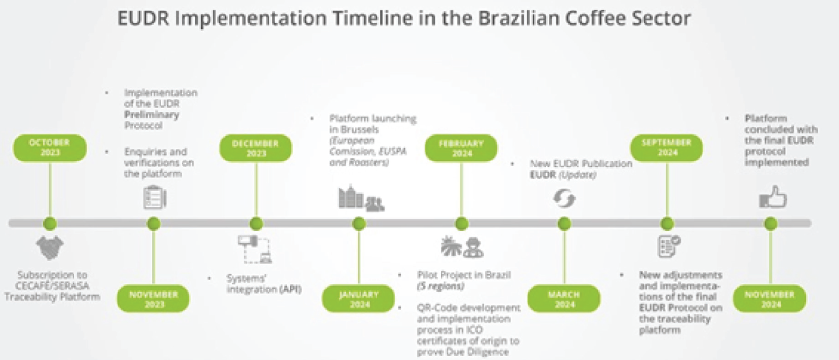
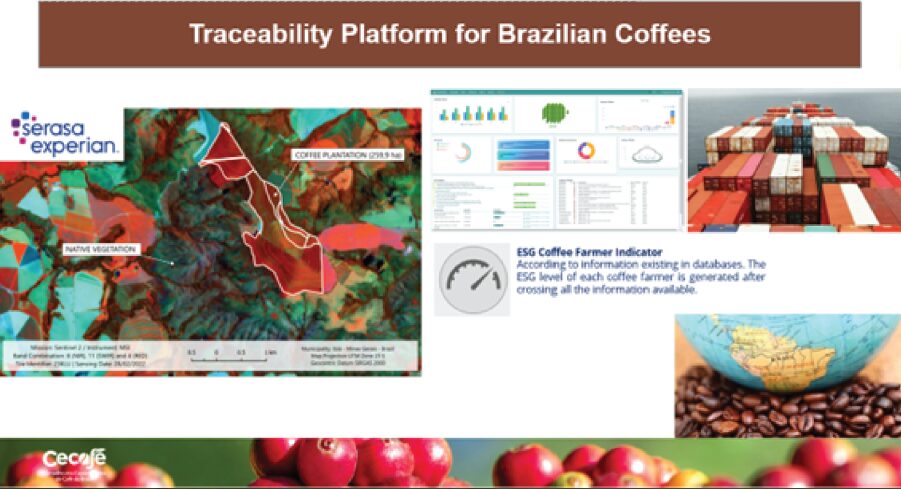


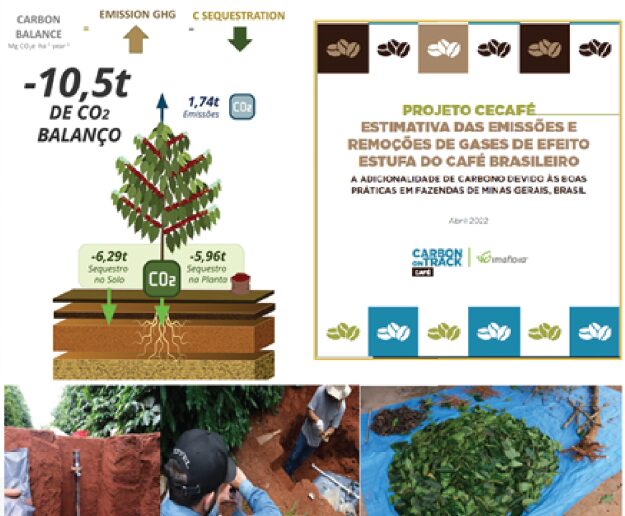
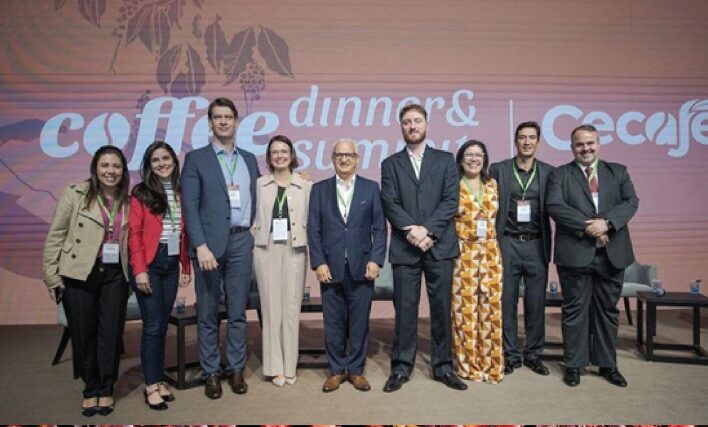
Leave A Comment